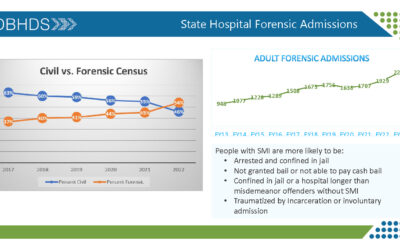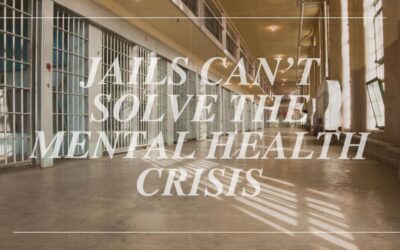It is no secret that a large percentage of high school and college students suffer from mental health issues; most notably, depression and anxiety. Depression—also known as major depressive disorder or clinical depression—is characterized as a mood disorder that “causes severe symptoms that affect how you feel, think, and handle daily activities, such as sleeping, eating, or working,” according to the National Institute of Mental Health. Closely linked to depression are anxiety disorders, which—unlike the normal feelings of nervousness or stress in everyday life—causes anxiety that “does not go away and can get worse over time,” (National Institute of Mental Health). As related to adolescents and young adults, these mental health conditions are of growing concern as the anxiety and depression self-report rates continue to climb. Predicted reasons for this steep increase are the massive amounts of stress in school, use of social media, and high expectations to succeed in school and other aspects of life.
As of the Fall 2019 American College Health Association National College Health Assessment, 23.6% of college students reported being diagnosed with anxiety, 19.2% with depression, and 15.4% with both depression and anxiety. This was pre-COVID-19—and it’s baffling to imagine how this data would change with the onset of a global pandemic. Through the stressors of being sent home to potentially unsupportive environments, experiencing the virus itself, taking care of and possibly losing sick loved ones, switching to online classes—and so much more— I cannot imagine how students’ mental health conditions would worsen. Students and young individuals may feel socially isolated during quarantine and social isolation, on top of the missed milestones such as graduation and end-of-year events. As I mentioned in my introductory blog post, an April 2020 survey from Active Minds showed that 1 in 5 students said their mental health worsened in general upon the onset of COVID-19.
In Virginia, constituents who have filled out the Mental Health America mental health screening tools showed increasing concerns about their mental health, especially young people. There were 1,500 MHA mental health screens taken by people in Virginia during the 1st quarter of 2020, which was from January through March. Of those:
- 74% were female.
- 25% were between 18 and 24 years old, 27% were between 11 and 17 years old.
- The most frequent screens taken were the depression screen and the anxiety screen.
- 30% of the depression screens scored as indicating moderate to severe depression.
- 23% of the anxiety screens scored as indicating moderate to severe anxiety.
Depression and anxiety might have particular implications on the population already suffering from these conditions as well as those who may experience symptoms as a byproduct of COVID-19. For individuals who have received treatment in the past, the pandemic may have created barriers to accessing therapy, remembering to take medications, or maintaining contact with support systems. For others, anxiety and/or depression may have arisen due to the ongoing uncertainty and all-consuming nature of COVID-19; furthermore, the world is facing immense losses right now, and grief from losing a loved one is, of course, devastating.
As state economies begin to open and cases increase in states like Florida and California, the unpredictability of the pandemic can certainly cause intense stress and uncertainty. Because we may face a second wave in the future or continue to explore what a “new normal” may look like, it’s important to keep your treatment routine consistent (if you can) and watch out for those around you. For universities around the country juggling the pros and cons of reopening or continuing with remote learning, the stress among college students yearning to return to school could very well rise. With that being said, I want to pose useful tips from the University of Michigan Depression Center for managing your own anxiety and depression during these trying times. Even if you have not been diagnosed with any sort of mental health condition, it’s likely the pandemic has caused some sort of disruption in your life or someone’s life that you know.
- Continue following your treatment plan.
- Make sure you have refills of your medication
- Talked to family or a loved one
- If you or a loved one becomes depressed or your pandemic anxiety is difficult to manage alone, contact your provider or a hotline (see resources below)
- Remind yourself this is temporary.
- Try to focus on what you can control right now.
- Take care of your body.
- Take a shower or a bath
- Eat well-balanced meals
- Try to exercise and move your body regularly
- Stretch, meditate, walk
- Practice self-care through self-care, staying in contact with your support network, and limiting media exposure.
- If you are finding the news distressing, do your best to limit your news consumption to a few specific times during the day (e.g. about 15 minutes a day in the morning and 15 minutes a day in the evening) for key practical information. Tune into trusted sources such as the Centers for Disease Control and Prevention (CDC), the World Health Organization (WHO), or your state health department. Avoid watching or reading news on social media where information can be exaggerated or incorrect.
- If you are able and it makes you feel good, donate your time or money to local food banks, blood drives, or children in need.
- For some, giving back to the community and making a difference can help people take action and feel more in control.
Whether you are an advocate for mental health or have experienced mental illness yourself, reading articles like this one, and caring for your loved ones can be emotionally draining. Focusing on your self-care is as important as ever right now during times of social isolation, and remember to set boundaries on caring for others and take breaks when you need.
For anyone seeking mental health support and resources, I have created a list of services and information below. For more in-depth information for allies and friends or family of someone with a mental health condition, I have provided resources for you as well. Please feel free to share these resources to help protect people struggling with depression, anxiety, and other mental health struggles during COVID-19 and beyond.
Direct Care/Hotlines:
National Suicide Prevention Lifeline: 24/7, confidential, and free
- Call 1-800-273-8255 for distress, prevention and crisis resources for you or your loved ones, and best practices for professionals or online chat here
SAMHSA Disaster Distress Helpline: 24/7, confidential, and free
- Call 1-800-985-5990 or text TalkWithUs to 66746 to access the national hotline dedicated to providing immediate crisis counseling for people who are experiencing emotional distress related to any natural or human-caused disaster.
Mental Health America of Virginia
- If you are a Virginia constituent looking to access free online screening tools for mental health conditions, click this link here
- Go to the “Resources and Support” Tab and click “Mental Health Screening Tools” to access screening
- For Virginia constituents:
- The Mental Health America of Virginia Warm Line is available at 1-866-400-MHAV (6428) for mental health resources and referrals in Virginia
Mental Health America:
- Free online screening tools for mental health conditions here
- General resource list for COVID-19 and mental health here
Therepeasy:
- Help get matched to an online mental health provider here
- Totally free, accessible, and instant matching with a therapist
American Psychological Association Help Center:
- List of national and statewide hotlines for support here
- Search tool to find a psychologist near you for longer-term help here
Crisis Text Line: 24/7, confidential, and free
- Free texting service that can be accessed by texting HOME to 741741 for free, 24/7 crisis counseling
HelpGuide:
- A guide to mental health and wellness, with COVID-19 resources available here
Black Emotional and Mental Health (BEAM) Collective:
- Dedicated to the healing, wellness, and liberation of Black and marginalized communities, with a Black Virtual Therapist Directory tool here
The Loveland Foundation
- Access for Black women and girls apply for free mental health services through The Loveland Foundation Therapy Fund
- Learn more about the services and application process here
Men To Heal:
- An initiative that encourages men to pay more attention to their overall wellness, mental and physical health, to communicate effectively and increase their knowledge of self, especially African American men who face additional stigma
- The founder, James Harris, hosts quarterly sessions within the local community in Virginia or virtually in other states through The Healing Hub
National Asian American Pacific Islander Mental Health Association (NAAPIMHA):
- This resource provides mental health and behavioral services for Asian Americans, Native Hawaiians, and Pacific Islanders here
- COVID-19 resources for Asian Americans are available here
The Trevor Project: 24/7, confidential, and free
- A national organization providing crisis intervention and suicide prevention services to (LGBTQ) young people ages 13-24.
- Call 1-866-488-7386 to access the TrevorLifeline suicide prevention and crisis intervention phone service or online chat here
- Text START to 678-678 to access confidential, 24/7 TrevorText with a counselor
Trans Lifeline: free and confidential, 10 am-4 am EST each day
- A trans-led organization that connects trans people to the community, support, and resources they need to survive and thrive
- Call 877-565-8860 in the U.S. or 877-330-6366 in Canada or email contact@translifeline.org for confidential support from trans-identifying counselors
National Runaway Safeline: 24/7, confidential, and free
- Call 1-800-786-2929, text 66008, or access free online chat here to assist runaway, homeless, and at-risk youth with crisis intervention and safety planning services
Boys Town National Hotline: 24/7, free
- Call 1-800-448-3000 or text VOICE to 20121 to access a crisis and resource line staffed by counselors to provide information about a variety of issues, including chemical dependency or access the website here
Additional Mental Health Resources:
- Centers for Disease Control and Prevention, coping with stress during COVID-19
- “Tips on depression management in lockdown: Coping with COVID-19”, from MedicalNewsToday
- “Signs of Depression During the Coronavirus Crisis”, by Caroline Miller from the Child Mind Institute
- Coronavirus Aid, Relief, and Economic Security (CARES) Act information
- Black Mental Health Alliance, an organization committed to educating the public on culturally competent approaches for Black mental health
- “Going To Therapy As A QTPOC, Without Being Harmed, Erased Or Baffled”, an article from BGD on finding the right therapist for you as a queer and/or trans person of color who needs support
- Substance Abuse and Mental Health Services Administration (SAMHSA), with the mission to reduce the impact of substance abuse and mental illness on America’s communities
- National Alliance on Mental Illness (NAMI) COVID-19 Resource and Information Guide, updated June 2020
- “Anxious About the Coronavirus? Here Are Eight Practical Tips on How to Stay Calm and Support Your Immune System”, article by Sheila Patel, M.D., Chief Medical Officer from the Chopra Center
Useful Articles, Links, and Resources for Allies and Activists:
- Helping Someone with Depression, tips from the Mayo Clinic
- “When Your Friend Is Depressed…Don’t and Dos”, tips from PsychologyToday
- Mental Health Conditions, information from Mental Health America National
- “Recognizing Warning Signs And How To Cope”, from Mental Health America National
- Finding Mental Health Help For Someone Else, from Mental Health America National
- “Addressing Poverty and Mental Illness”, by Kevin M. Simon, MD; Michaela Beder, MD; and Marc W. Manseau, MD, MPH from the Psychiatric Times
- “Social Determinants of Mental Health”, from a WHO Report
- How to Help Someone with Anxiety, from Johns Hopkins Medicine
- “Is There an Anxiety Epidemic”, from PsychologyToday
- “Mental Illness Will Cost the World $16 USD Trillion by 2030”, from the Carter Center in the Psychiatric Times
Anna Marston, Intern
Mental Health America of Virginia



